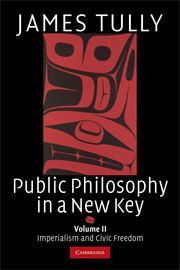Book contents
- Frontmatter
- Contents
- Acknowledgments
- Credits
- INTRODUCTION
- PART 1 GLOBAL GOVERNANCE AND PRACTICES OF FREEDOM
- PART 2 ON IMPERIALISM
- CONCLUSION: CIVIC FREEDOM CONTRA IMPERIALISM
- 8 A new kind of Europe? Democratic integration in the European Union
- 9 On local and global citizenship: an apprenticeship manual
- Bibliography
- Index to Volume II
8 - A new kind of Europe? Democratic integration in the European Union
Published online by Cambridge University Press: 05 September 2012
- Frontmatter
- Contents
- Acknowledgments
- Credits
- INTRODUCTION
- PART 1 GLOBAL GOVERNANCE AND PRACTICES OF FREEDOM
- PART 2 ON IMPERIALISM
- CONCLUSION: CIVIC FREEDOM CONTRA IMPERIALISM
- 8 A new kind of Europe? Democratic integration in the European Union
- 9 On local and global citizenship: an apprenticeship manual
- Bibliography
- Index to Volume II
Summary
INTRODUCTION
In this and the following chapter, I turn to the question of how practitioners of civic freedom and public philosophy can work concretely and democratically to address the political struggles we have studied in the course of the two volumes. These are, to recall, the interrelated struggles over recognition and distribution in Volume I and over the environment and the de-imperialisation and democratisation of oppressive global relationships in Volume II. This chapter addresses what can be done within the European Union and the final chapter focuses on global and local citizen practices of freedom.
Critical reflection and debate on the forms of integration of the diverse members of the EU have always been a part of the integration processes since the beginning of the European Community. However, since the global War on Terror and the explosion of conflicts over immigration, economic policy and foreign policy, the question of integration has become the most urgent challenge facing Europeans: the epicentre of struggles on the ground and of critical reflection and rival solutions in the popular media, policy communities and academic research. In response to this complex and unpredictable terrain of integration conflicts and disintegration trends, I would like to propose for consideration a new answer to the question of integration; an answer appropriate to today's problems. This is not a specific answer in the sense of a set of policy recommendations, but, rather, a general form of orientation to the conflicts over integration for citizens, policy makers and academic researchers.
- Type
- Chapter
- Information
- Public Philosophy in a New Key , pp. 225 - 242Publisher: Cambridge University PressPrint publication year: 2008
- 1
- Cited by

